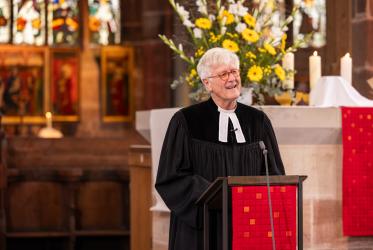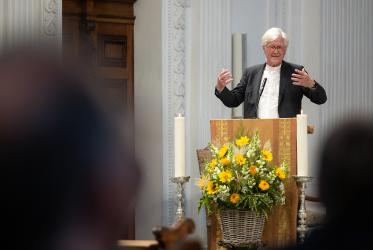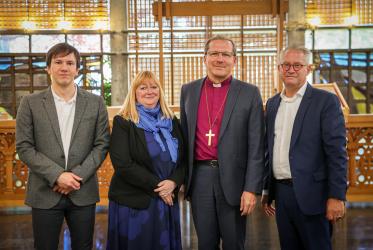A scholarly work on the “globalization” of the World Council of Church (WCC) in the 1960s and 1970s was presented at a book launch in the WCC Archives, Geneva, on 6 June 2014. Globalisierung der Kirchen (Globalization of the Churches), a collection of eight articles in German and six in English, was edited by German historians of the ecumenical movement Katharina Kunter of Bochum and Annegreth Schilling of Frankfurt.
The volume was introduced at a panel discussion moderated by Dagmar Heller of the Ecumenical Institute in Bossey, Switzerland, and featuring the two editors and two Geneva-based authors of articles, Stephen Brown and Odair Pedroso Mateus. Heller recalled that the research project on which the book was based had held an earlier consultation of authors and interested parties in March 2011 at Bossey.
Schilling explained that the contributors reflect the moment in the “long Sixties,” from the late 1950s into the 1970s, when the World Council of Churches ceased to be a predominately “Anglo-American” organization and evolved into a truly international network of churches with leadership drawn from many continents. It is in this sense, as the book’s subtitle indicates, that it captures the story of the WCC’s “discovery of the Third World”.
According to Kunter, the role of the churches in internationalization during the last half of the twentieth century has been “a neglected field of world history.” The introduction to the book, with supporting figures in the appendices, gives an overview of the period with individual case studies in the following articles on such topics as the 1968 WCC assembly in Uppsala, Sweden, the WCC Programme to Combat Racism, European colonialism and the Vietnam war, as well as articles on such theologians as Joséf Hromádka, José Míguez Bonino and Ernst Lange.
Mateus noted that the ethics of the ecumenical movement became less idealistic, and more concrete during this time. The concept of unity often had been idealized or romanticized. It became necessary to ask whether division from some churches – for example, those that supported apartheid in southern Africa – might be the first step toward “true” unity in Christ.
Questions raised in this period inform the present, and many remain relevant. Speaking about the late German ecumenist Ernst Lange, Stephen Brown noted that Lange’s insights may be applied to the WCC’s current programme emphasis on “the pilgrimage of justice and peace.” How, asked Brown, “will the ecumenical movement and the churches face the world disorder, as apparent now as it was at the end of the 1960s, and the questions of justice, equality of opportunity, and the redistribution of power and resources within their own ranks?”
In a question-and-answer session, panellists admitted that the research project in itself is very European, lacking many voices from the global South and maintaining a focus on men who were active in the 1960s to the exclusion of many women. They explained that this book is meant to be a first step toward further work in the field.
Globalisierung der Kirchen: Der Ökumenische Rat der Kirchen und die Entdeckung der Dritten Welt in den 1960er und 1970er Jahren, herausgegeben von Katharina Kunter und Annegreth Schilling (Göttingen: Vandenhoek & Ruprecht, 2014)
WCC news release, March 2011: Scholars study WCC in 1960s and ‘70s





